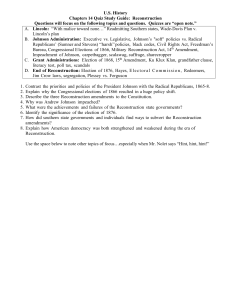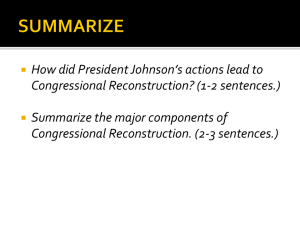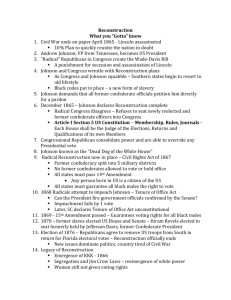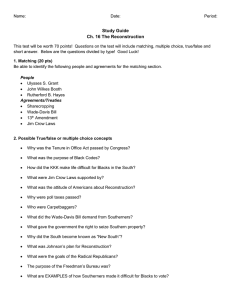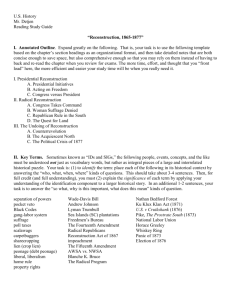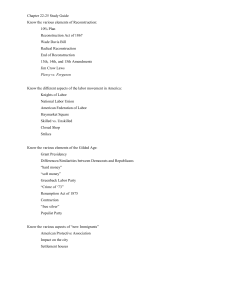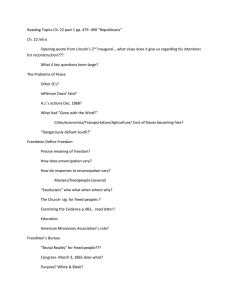Reconstruction - Saugerties Central School
advertisement
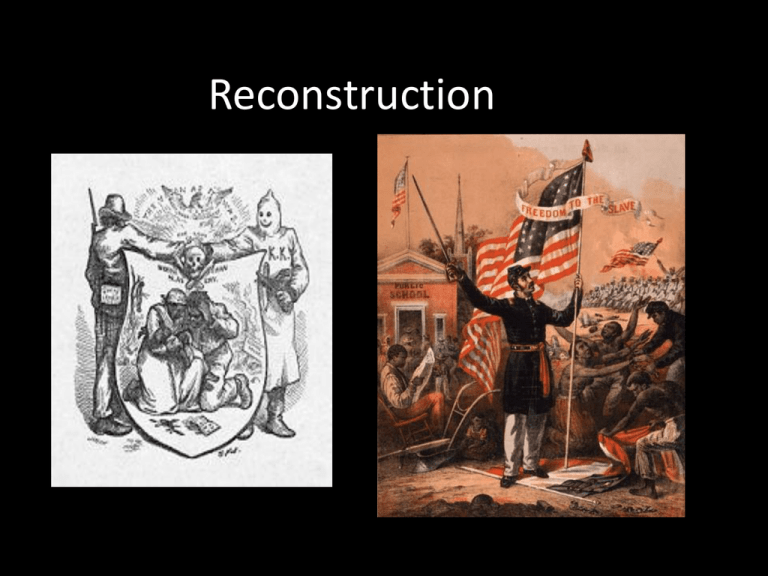
Reconstruction Preparing for Reunion • Abraham Lincoln – Ten Percent Plan (December of 1863) • Wanted to make it easy for the south to rejoin the union • Ten Percent of the states voters needed to swear an oath of loyalty to the Unites States Preparing for Reunion • Wade Davis Bill (June of 1863) – Radical Republicans: Wanted a more strict reconstruction of the country – 50 Percent of voters would have to sign loyalty oath – Lincoln NEVER signed the bill and it never became a law Lincoln Assassination • April 14, 1865 – John Wilkes Booth killed Lincoln at Ford’s Theater • Vice President Andrew Johnson became President of the United States Andrew Johnson • Became President after Lincoln assassination • A southern Democrat that remained loyal to the Union Johnson’s Plan • Johnson wanted an easy transition from the Civil War • Issued amnesty to most of the former Confederates • States needed to form new state governments and abolish slavery Radicals in Charge • Congress wanted a stricter form of Reconstruction to punish the south • Radical Republicans had enough control to override any vetoes from President Johnson Reconstruction Amendments • 13th Amendment: (1865) Banned Slavery in the United States • 14th Amendment: (1868) All people born or naturalized in the United States are citizens (all slaves are now citizens) Also a state cannot pass laws that take away a citizen’s rights without due process of law • 15th Amendment: (1869) Gave African American males the right to vote Freedmen’s Bureau • Provide Emergency relief to people displaced by the war • Set up schools to help freedmen to learn to read and write • Helped freedmen find jobs Radical Reconstruction • Reconstruction Act of 1867 – Imposed military rule on states refusing to accept 14th amend. – Soldiers helped southern black voters register and vote Hope and Advancement • African Americans were allowed to play an active role in politics – They were elected as sheriffs, mayors, and legislators • Hiram Revels and Blanche Bruce Both were first African American Senators What were the expectations of the freedmen at the beginning of Reconstruction? Were these expectations being met at the beginning of Reconstruction? Why or Why not? Southern Republican Followers • Scalawags: southern whites that opposed secession • Carpetbaggers: northerners that went south for personal gain • Freedmen Radical Republicans vs. President Johnson • Johnson and the Radical Republicans had different views of Reconstruction • Radicals tried to impeach President Johnson – Johnson escaped being impeached • (he won barely the vote was 35 to 19 one vote shy of the two-thirds majority that is needed for impeachment) Election of 1868 • General Ulysses S. Grant – Civil War hero – Republican (Not a Radical Republican) – With his win the Radical Republicans started losing control Reconstruction’s Conclusion • By 1870 the support for Reconstruction began to decline – By 1877 the Radical Republicans had lost all of their power in the south Reconstruction’s Conclusion • Election of 1876 – THE END OF RECONSTRUCTION WAS A DIRECT RESULT OF THE PRESIDENTIAL ELECTION OF 1876 Election of 1876 • Because of disputes over election returns it was left up to Congress to decide the winner • A deal between the Republicans and Democrats settled the election Election of 1876 • The Candidates were Republican Rutherford B. Hayes and Democrat Samuel J. Tilden • Republicans wanted to continue Reconstruction and the Democrats wanted to end reconstruction – Tilden won the popular vote but 20 electoral votes were in dispute (Tilden was one electoral vote shy of winning) Hayes Tilden Election of 1876 • To resolve the issue Congress created a committee – The committee gave all of the electoral votes to Rutherford B. Hayes (Even though he lost the popular vote) • Hayes informed the Democrats that he would end Reconstruction, and the Democrats did no contest Congress’ decision • Once in office Hayes removed all federal troops and ended Reconstruction Aftermath of Reconstruction • At the end of Reconstruction African Americans began to lose all of their rights in the South African Americans Lose Rights • To take away voting rights people in the south created laws – Poll Tax- a tax to be paid before voting – Literacy test- a test to see if a person can read or write that needed to be passed before a person can vote – Grandfather clause- if your father or grandfather voted then a person is eligible to vote African Americans Lose Rights • Segregation: Enforced separation of races (legally) – Known as Jim Crow Laws • Banned mixing of races in almost every aspect of life • Separate hospitals, schools, cemeteries, restaurants, playgrounds Plessy v. Ferguson • 1896 • Homer Plessy was arrested for sitting in a coach marked “for whites only” • The Court ruled in favor of segregation – Stated separate is fine as long as the facilities were equal Cycle of Poverty • Sharecroppers: worker that works the land for the farmer who owns it, and in exchange for a share of the value of the crop. Cycle of Poverty 1. Planting the crop Landowners give the sharecropper land, seed, and tools in exchange for a share in the crop. Sharecroppers buy goods and supplies from the landowner on credit 2. Harvesting the crop and settling accounts The sharecropper gives the landowner his crop. Landowner sells it and gives the tenant his share, minus the amount owed at the company store 3. Cycle of debt After a year of hard work, the sharecropper often owed more than they had earned and had no choice but to offer the landlord a greater percentage of next year’s crop
